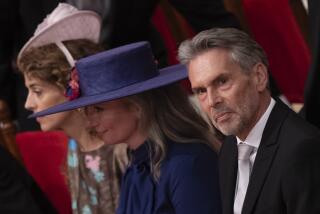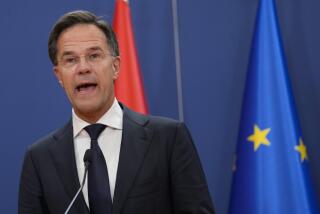EUROPE : Faux Pas on EC Treaty Sends Dutch Back to Drawing Board
- Share via
LONDON — As a result of what is generally considered Dutch diplomatic ineptness, a new European Community treaty on political union has been dealt a serious setback.
“The Dutch tried to expand on an earlier draft,” commented one EC official. “But they got it wrong, and now three months have been lost.”
EC ministers have been cobbling together draft versions of treaties on political and monetary union, which would amend the 1957 Treaty of Rome, the constitution for the original Common Market countries.
The treaties were scheduled to be presented to the next 12-member EC summit meeting in Maastricht in the Netherlands in early December, in what most European diplomats believed would be a historic step forward. According to EC negotiators, the political draft was expected to eventually lead to a middle-of-the-road position on European union--one with which the British could agree.
In July, the Netherlands took over the six-month EC presidency from Luxembourg, inheriting the responsibility for preparing the monetary and political treaties for the December summit. The idea was that, after summit approval, both treaties would be submitted to the various national legislatures for ratification, a process that could take at least a year.
But, according to EC diplomats, something went badly awry: With Dutch Prime Minister Ruud Lubbers embroiled in domestic politics and Foreign Minister Hans van den Broek absorbed in the Yugoslav crisis, the project was left to European Affairs Minister Piet Dankert, a Socialist with strong federal views.
Dankert’s version went far beyond the Luxembourg government draft, calling for a political union with vast authority over EC member nations’ foreign and defense policies--much to the dismay of the British, who favor lesser such powers.
On Monday, the Dutch were humiliated at a meeting of EC foreign ministers, which rejected their draft treaty by an unprecedented 10-2 vote, with only the Belgians in support.
“One of the worst political blunders ever,” thundered the conservative Dutch daily newspaper De Telegraaf.
“It was back to the drawing board for the Dutch,” said one diplomat here. “The question is whether they can go back to the original draft, consult with the other countries, make the necessary adjustments and have something solid to present to their summit.”
“We intend to push ahead,” insisted Foreign Minister Van den Broek.
But, in view of the Dutch performance to date, British and other diplomats were more skeptical.
One EC official suggested that a treaty on political union might not be ready for the December summit and that only the document on monetary union--which is proceeding largely on schedule--could be signed.
The failure of the Dutch to find a compromise path underscores internal differences in the EC, which have intensified because of the collapse of communism and the turmoil in Yugoslavia.
Some EC countries favor widening the community to include liberated East European nations, while others oppose such a move; others wanted to send a large peacekeeping force into Yugoslavia, while countries such as Britain would first require an official Yugoslav invitation and a firm cease-fire.
“We are all in something of a quandary,” admitted an EC diplomat. “It’s a different world we’re dealing with now. We’re finding it difficult to face up to change.”
The hitch in treaty preparation also suggested to some observers that there is a weakness in the EC’s leadership pattern, in which the presidency rotates twice a year. Each government is interested in putting its own stamp on European affairs. In the view of the Times of London, the system tends to produce “half-yearly, half-baked” initiatives.
More to Read
Sign up for Essential California
The most important California stories and recommendations in your inbox every morning.
You may occasionally receive promotional content from the Los Angeles Times.













